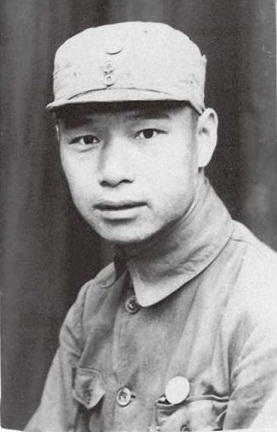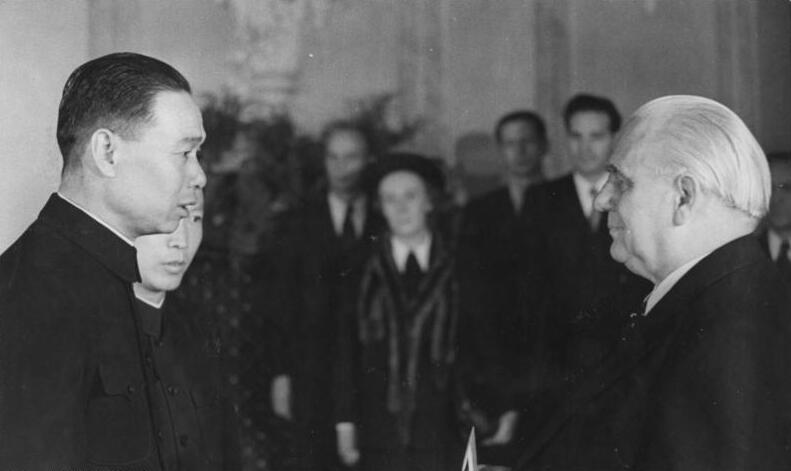1. Overview

Ji Pengfei was a prominent Chinese politician and diplomat who played a significant role in the People's Republic of China's foreign policy and administration from the mid-20th century until his death. Born in Linyi County, Shanxi in 1910, he joined the Chinese Red Army in 1931 and the Chinese Communist Party (CCP) in 1933, participating in the Long March. His career spanned key periods, including the establishment of the People's Republic, the tumultuous Cultural Revolution, and the post-Mao reforms. He served as China's first ambassador to the German Democratic Republic, Vice Minister of Foreign Affairs, and later as Minister of Foreign Affairs. A key figure in the normalization of relations with Japan, he signed the historic Japan-China Joint Communiqué in 1972. In the post-Cultural Revolution era, he held influential positions such as Vice Premier, Secretary-General of the State Council, and head of the Hong Kong and Macau Affairs Office, where he oversaw the preparations for the return of Hong Kong and Macau. His later life was marked by controversy, including his son's conviction for corruption and allegations surrounding his own death. Despite these controversies, he received official commendation as an "outstanding communist fighter" and was honored posthumously. This article will examine his life and career, critically assessing his contributions and the controversies that shaped his legacy, particularly from a perspective that considers the impact on human rights and social progress.
2. Early Life
Ji Pengfei's early life laid the foundation for his long and impactful career in Chinese politics and diplomacy.
2.1. Birth and Family
Ji Pengfei was born on February 2, 1910, in Linyi County, Yuncheng City, Shanxi province, which was then part of the Qing dynasty. His birth name was 姬宏邠Ji HongbinChinese, and he was also known by the old name 吉洛JiluoChinese.
2.2. Education
Details of Ji Pengfei's formal education are limited, but he received training as a military doctor. This medical background influenced his long-term involvement in military hygiene and political work within the armed forces during his early revolutionary career.
3. Revolutionary Career
Ji Pengfei's involvement in the Chinese revolution began in the early 1930s, where he quickly rose through the ranks due to his dedication and skills.
3.1. Joining the People's Liberation Army
In 1931, Ji Pengfei joined the Chinese Red Army, marking the beginning of his military service. His enlistment followed events such as the Ningdu Mutiny.
3.2. Joining the Chinese Communist Party and Early Activities
He became a member of the Chinese Communist Party (CCP) in 1933. As an early and veteran party member, he participated in the arduous Long March, a pivotal event in the history of the Chinese Communist Party. Throughout this period, he was extensively involved in the hygiene and political aspects of the military units.
4. Diplomatic and Public Service Career
Ji Pengfei's career in diplomacy and public administration was extensive, marked by significant contributions to China's foreign policy and domestic governance.
4.1. Ministry of Foreign Affairs
Following the establishment of the People's Republic of China, Ji Pengfei transitioned into the diplomatic field, working with the Ministry of Foreign Affairs. He played a crucial role in shaping China's international relations during a period of significant global change.
4.1.1. Ambassador to the German Democratic Republic
In September 1950, Ji Pengfei was appointed to lead diplomatic missions to East Germany. He later became China's first ambassador to the German Democratic Republic (GDR) in 1953, a position he held until January 1955. At 43 years old, he was the youngest Chinese ambassador at the time. During his tenure, he met with prominent figures such as Wilhelm Pieck, the President of the GDR.

4.1.2. Vice Minister of Foreign Affairs
After his return from the GDR, Ji Pengfei was recalled to serve as Vice Minister of Foreign Affairs in 1955. In this capacity, he worked alongside and supported key figures in Chinese diplomacy, including Zhou Enlai (who served as Foreign Minister from 1949 to 1958) and Chen Yi (Foreign Minister from 1958 to 1972), contributing significantly to the direction of China's foreign policy.
4.1.3. Minister of Foreign Affairs
In June 1972, following the death of Chen Yi, Ji Pengfei took over the role of Foreign Minister, initially in an acting capacity before being formally appointed. He held this position until November 1974. During his tenure, he was also elected as a member of the CCP Central Committee.
4.2. Signing the Sino-Japanese Joint Communiqué
A landmark achievement during his time as Foreign Minister was his involvement in the normalization of diplomatic relations between China and Japan. In 1972, he signed the historic Japan-China Joint Communiqué in Beijing. The communiqué was also signed by Japanese Prime Minister Kakuei Tanaka and Foreign Minister Masayoshi Ohira, with Chinese Premier Zhou Enlai also present. This agreement officially ended the "abnormal state of affairs" between the two countries and established diplomatic ties.
4.3. Activities during the Cultural Revolution
When the tumultuous Cultural Revolution erupted, Ji Pengfei, along with Chen Yi and Qiao Guanhua, was initially targeted as a member of a "counter-revolutionary clique" within the Foreign Ministry. Despite these accusations, he was relatively untouched by the purges and managed to remain at his post, continuing his work throughout the challenging period.
4.4. Post-Cultural Revolution Roles
In the period following the Cultural Revolution, Ji Pengfei held several high-ranking and influential positions, playing a crucial role in China's administrative and international affairs during its reform and opening-up era.
4.4.1. Head of the International Liaison Department of the CCP Central Committee
In 1979, he was appointed as the head of the International Liaison Department of the CCP Central Committee, a key body responsible for the CCP's relations with foreign communist parties and organizations. He served in this role until 1982.
4.4.2. Vice Premier and Secretary-General of the State Council
From 1980 to 1982, Ji Pengfei served as Vice Premier of the State Council. Concurrently, he held the position of Secretary-General of the State Council from March 1978 to June 1982, acting as the chief administrator of China's central government.
4.4.3. Secretary-General of the Standing Committee of the National People's Congress
In 1975, Ji Pengfei was appointed Secretary-General of the Standing Committee of the National People's Congress, a role that was confirmed in 1978. He also served as a Vice Chairman of the Standing Committee of the National People's Congress from March 1978 to June 1983, overseeing administrative duties within China's top legislative body.
4.4.4. Head of the Hong Kong and Macau Affairs Office
From 1983 to 1990, and specifically from 1987 to 1990 as its head, Ji Pengfei led the Hong Kong and Macau Affairs Office. In this critical role, he was responsible for the preparations for the transfer of sovereignty of Hong Kong and Macau from British and Portuguese rule to China. He also served as the chairman of the Hong Kong Basic Law Drafting Committee, playing a central role in drafting the mini-constitution for the Hong Kong Special Administrative Region. He was present at the signing ceremony of the Sino-British Joint Declaration on Hong Kong.
4.4.5. Member of the Central Advisory Commission
Ji Pengfei was a Standing Committee member of the Central Advisory Commission, a Party body established in 1982 to facilitate the retirement of senior officials while allowing them to retain some influence. He served on this commission from its creation until its abolition in October 1992, specifically from September 1985 to October 1992.
5. Personal Life and Controversies
Ji Pengfei's later years were overshadowed by significant personal and family controversies that drew public attention and raised questions about accountability within the Chinese political system.
5.1. Son's Corruption Case
In 1999, Ji Pengfei's son, Ji Shengde, a senior member of the People's Liberation Army intelligence apparatus, was arrested. He was subsequently tried and convicted on charges of corruption, selling classified information, and diverting public funds. The case was linked to the major Yuanhua smuggling case. Initially, Ji Shengde was sentenced to death. However, his sentence was later commuted to 20 years in prison, and then to life imprisonment, after he reportedly returned stolen money and denounced other abuses.
5.2. Allegations Regarding Death
Ji Pengfei died on February 10, 2000, at the age of 90. While officially reported as a natural death, allegations of suicide by poisoning emerged, particularly from overseas media and later within some Chinese publications. These allegations claimed that Ji Pengfei took his own life in February 2000, at the age of 91 (by East Asian age reckoning), in protest after Jiang Zemin, then General Secretary of the Chinese Communist Party, refused his plea for leniency for his son, Ji Shengde. This alleged act of protest, if true, would highlight the immense pressure and despair faced by high-ranking officials whose family members were implicated in corruption. In contrast to the official narrative of a distinguished communist leader, his funeral was reportedly modest, and the initial obituary from Xinhua News Agency in October 2001 was notably brief, leading to speculation that the Party sought to downplay the circumstances surrounding his death.
6. Evaluation and Legacy
Ji Pengfei's long career left a complex legacy, marked by significant contributions to China's diplomatic and administrative development, alongside controversies that reflect broader issues within the Chinese political system.
6.1. Official Commendation and Centenary Celebration
Despite the controversies surrounding his family and death, Ji Pengfei received official praise from the Xinhua News Agency, which lauded him as an "outstanding communist fighter" and a distinguished leader on the diplomatic front. In 2010, ten years after his death, a ceremony was held in the Great Hall of the People in Beijing to celebrate his 100th birth anniversary. This event served as a formal acknowledgment of his contributions by the Chinese Communist Party.
6.2. Historical and Social Assessment
Ji Pengfei is widely recognized for his pivotal role in shaping China's foreign policy, particularly in the post-1949 era. His diplomatic efforts, including his ambassadorship to East Germany and his tenure as Foreign Minister, were instrumental in establishing China's presence on the international stage and normalizing relations with key countries like Japan. His later administrative roles, especially in the Hong Kong and Macau Affairs Office, were critical for the smooth transition of these territories. However, his legacy is also complicated by the corruption charges against his son and the persistent allegations of his own suicide, which, if true, would underscore the severe consequences and moral dilemmas faced by individuals within a system grappling with issues of corruption and accountability. These events highlight the challenges of maintaining integrity and addressing human rights concerns even among high-ranking officials, offering a more nuanced perspective on his historical impact.